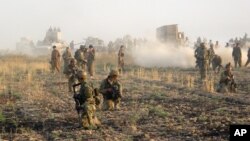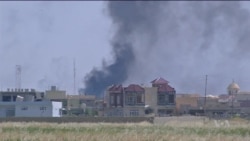The United States and its allies are expecting more offensives like the one Islamic State fighters pulled off Tuesday in northern Iraq, briefly breaking Kurdish Peshmerga lines and resulting in the death of a U.S. Navy SEAL.
U.S. officials have been adamant that IS is as vulnerable and weak as it has been since its fighters first pushed into Iraq in June 2014. But such optimism has been tempered by caution; defense and intelligence officials have repeatedly warned of the terror group's resilience.
One U.S. intelligence official, speaking to VOA on condition of anonymity, described the faster tempo of IS operations as a "lashing out," unlikely to slow in the near future.
"As it faces mounting losses of territory, ISIL is unable to respond to strategic defeats with effective counterattacks," the official said, using an acronym for the terror group.
The official also said the increasing number of attacks specifically targeting civilians, like those on Shia pilgrims in the Iraqi capital of Baghdad, "betray ISIL's desperation."
'Huge attack'
Tuesday's offensive, though, focused on Kurdish frontline positions, targeting forces that have been hailed as some of the most effective in the fight against IS.
Related story: Peshmerga Regroup to Recapture Iraqi Town from IS
"We were outgunned," Peshmerga fighter Osman Hussein said. "When their hammer vehicle entered, our shield wall collapsed. We couldn't do anything. We had to retreat."
IS launched the offensive at dawn Tuesday, hitting various Kurdish frontline positions north and south of Mosul with a combination of heavy weapons, and both vehicle-borne improvised explosive devices and suicide bombers.
"It was a very huge attack," said Peshmerga Gen. Hamid Afandi of the Islamic State operation in Telskuf, some 30 kilometers north of Mosul. "IS had control for about two to three hours."
It was a costly operation for IS, which held the towns of Telskuf and Musqelat only briefly. Kurdish officials said 80 IS fighters were killed in the battle and 25 vehicles were destroyed.
Repeatable operation
But a Western diplomat, talking to VOA on condition of anonymity, said it was the type of operation IS could very well repeat. And the official noted that being able to claim the attack was able to penetrate Kurdish lines and kill an elite U.S. Navy SEAL would make an impression with the terror group's target audience.
Former intelligence officers also warn against seeing the IS attack on Kurdish positions, or even the uptick in suicide bombings, as a sign that time is running out for the self-declared caliphate.
"I've always hated the 'when a terrorist group acts like a terrorist group, it's a sign of desperation' line," said Patrick Skinner, a former intelligence officer now with The Soufan Group.
"It's a sign of how nasty the tactical fight is," he said. "Overall, ISIS is losing, but the day to day doesn't abide to that trend line."
VOA's Sharon Behn and Ali Javanmardi contributed to this report from Irbil; Kurdish Service Reporter Kawa Omar contributed from near Mosul.






